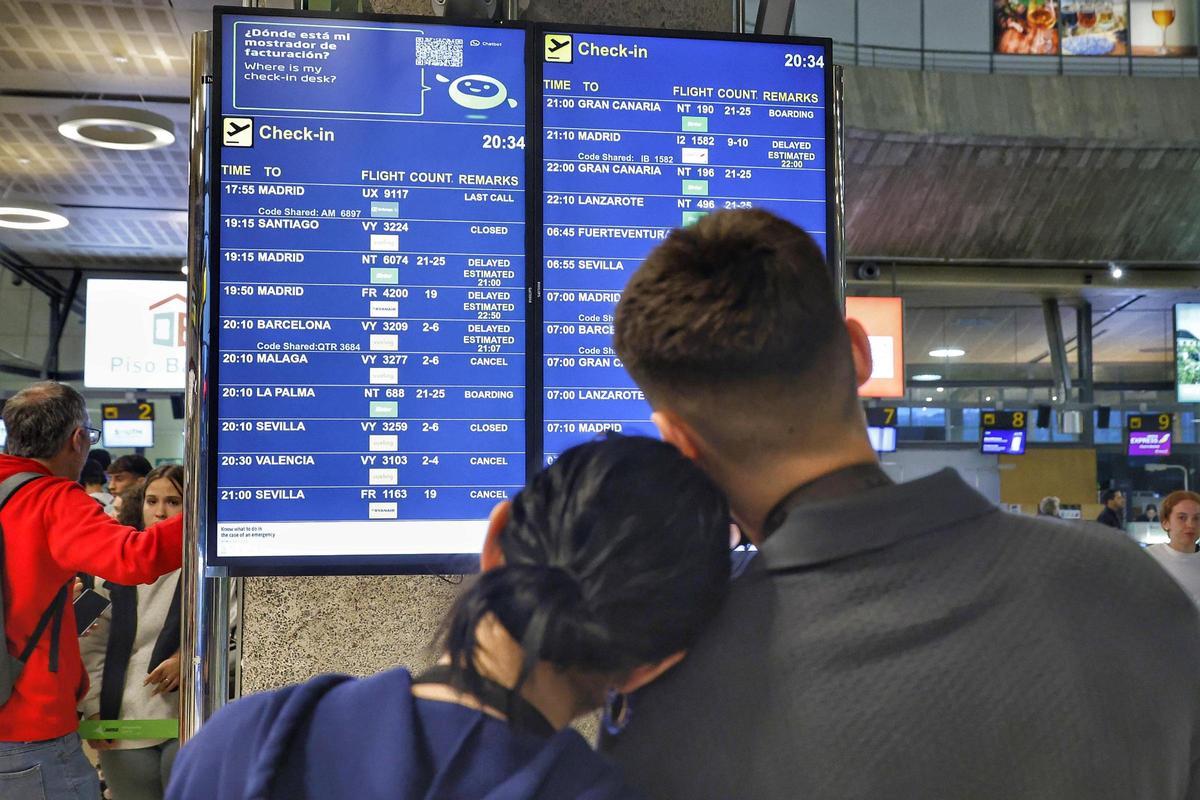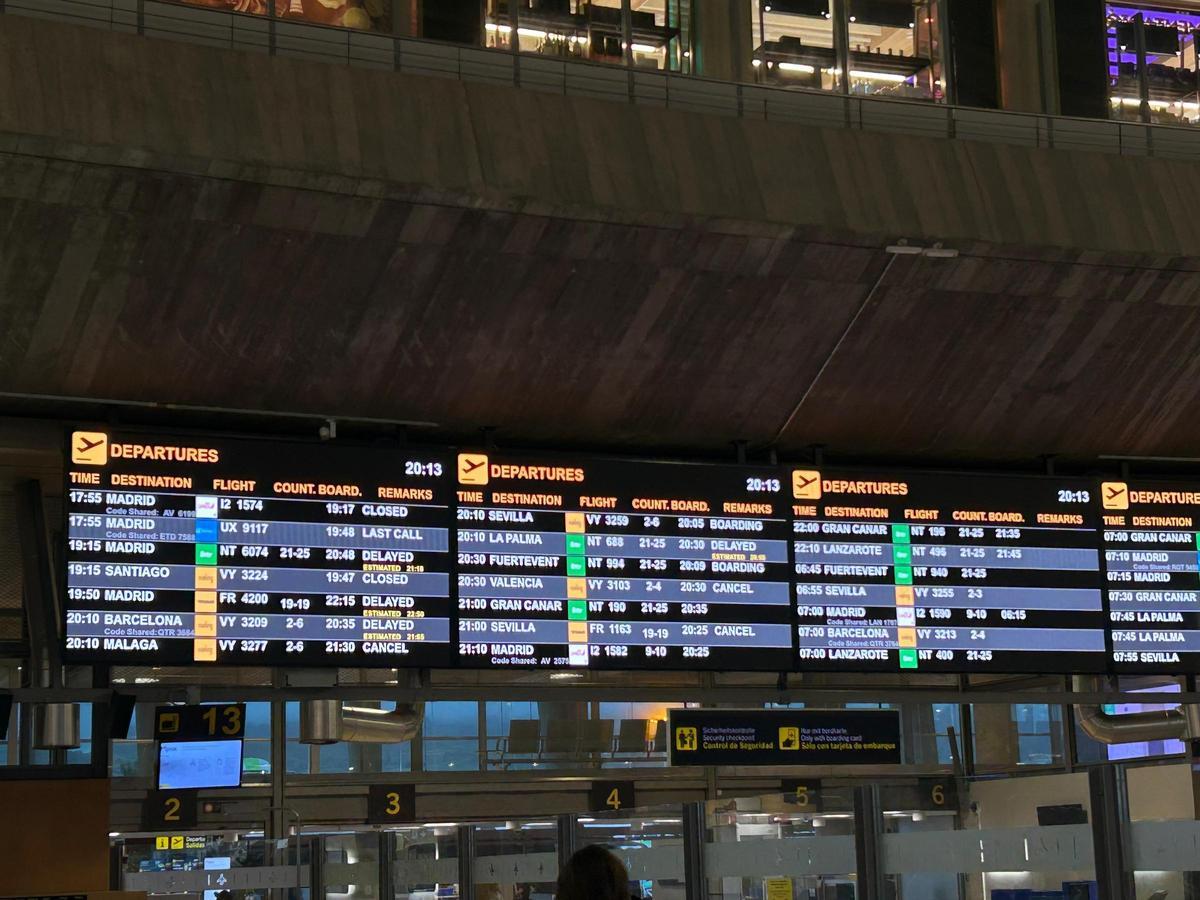Canarian airports have experienced significant flight delays with the mainland as well as cancellations affecting other European nations. The primary air terminals on the islands began to descend into chaos by the afternoon and evening as delays mounted for flights departing and arriving.
One of the airports hit hardest was Tenerife Norte (Los Rodeos), where disarray, frustration, and resignation enveloped the impacted passengers. By noon, these were the three terms most frequently heard among those waiting impatiently under the information screens or forming a lengthy queue that extended throughout half of the airport. Three flights to Valencia, Sevilla, and Malaga slated for around eight in the evening were cancelled, and three flights to Madrid and one to Barcelona encountered frequent time adjustments. The issue, however, was not with Tenerife. The collapse of the electrical and information systems at mainland airports caused aircraft to remain grounded, which, in turn, meant that flights to the island were unable to depart.
Around five in the afternoon, the initial cancellations and delays commenced. The mobiles of travellers scheduled to fly from six began to buzz with the first notifications from airlines: “Delays are occurring due to the national blackout; please approach the counter to verify your flight status.” This message ignited mayhem at Tenerife’s airfield.
The airlines most affected included Ryanair and Vueling. Numerous flights were cancelled at the Lanzarote airport, including routes to Lanzarote and Madrid, as well as Sevilla with Ryanair. Additionally, Vueling faced delays reaching up to three hours for flights to Barcelona, alongside one cancellation. British flights operated by Easyjet and other carriers also encountered disruptions on the island of the volcanoes.
Meanwhile, Gran Canaria saw several delays accumulate with other airlines like Iberia Express to Madrid.

Two young individuals in front of an airport information panel. / María Pisaca
20% Reduction
At noon, Aena announced that its airports were operating with relative normality thanks to their backup generators. Nevertheless, and “for safety,” Sánchez communicated following the CSN meeting that air traffic was reduced by 20%. In his latest statement, Sanchez specified that of the 6,000 flights scheduled for this Monday, only 344 had been cancelled.
At the airport, 12 children were playing among themselves while wearing sweatshirts from Valencia Club of Football
All of them had their flights booked for the early afternoon, and the blackout came as a shock after finishing a visit to the parrot park on an excursion they had organised before returning home. What began as a peaceful day swiftly turned into a nightmare: “We understand that such situations can occur, but what we fail to comprehend is why they would leave families with children abandoned to fend for themselves,” one parent expressed. From Vueling, one suggested resolution was simply that: “to fend for oneself and then submit invoices to companies.”
Another solution, albeit less extreme, still felt surreal. “The option they’re offering us is to reschedule flights for the 2nd or 5th of May, which is four to six days later than intended… And what are we supposed to do regarding children’s school or adults’ jobs?” Murgui questioned.
For now, the Valencia club assured accommodations for Monday night where they would stay during these days and “are arranging alternatives” for an expedient return.

Image of the Information Display at Tenerife Norte Airport / María Pisaca
Inability to Fly
They were not the only group of minors abandoned at Tenerife airport. One hundred students from the Antonio de Ulloa Institute, located in La Rinconada, Sevilla, were already seated at the airport with their bags as their flight was grounded after four days in Tenerife celebrating their end-of-course trip. One of the tutors, Lucas Expósito, gathered with others responsible for finding solutions. “Let’s see how we can organise the relocation of 100 minors, which is more than half a plane,” he remarked. This cohort was the second group scheduled to depart for Sevilla yesterday. By noon, around 90 individuals were still waiting, and for a moment, they believed they would take off too. “We have accommodations, but we’re uncertain about tomorrow’s plans,” he added.
Sergio and his six friends had a flight booked for six in the evening to Madrid. “Initially, they told us the flight would be delayed by an hour and a half, but when we checked again, it was pushed back another four hours,” he said. In this case, Ryanair was the airline involved, and they provided limited information on when they might return home after a stay on the island for a study trip. By eight in the evening, uncertainty still loomed. “If they cancel the flight, will they arrange a hotel for us, or are we supposed to get home by two in the morning?” he commented.
The chaos was not set to end at that expected arrival time. These youths from Madrid shared that, upon reaching the capital of Spain, they would lack transportation to reach their homes. “Our families have informed us that there are no taxis available at the airport, the subway is not running, and we have no way to communicate. It’s almost preferable to stay here, but we have no answers” he concluded.
















